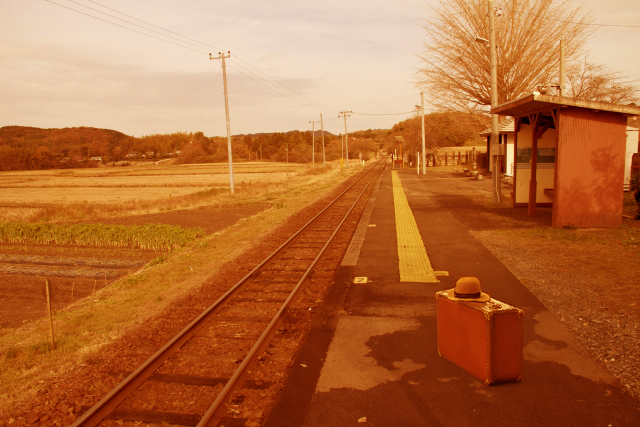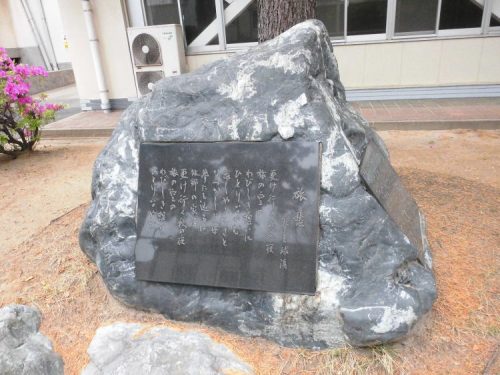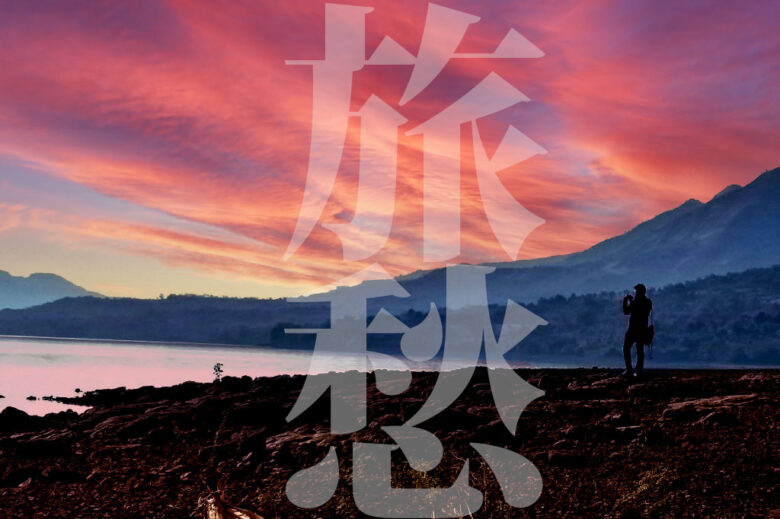Ryoshuu
Fukeyuku aki no yo tabi no sora no
Wabishiki omoi ni hitori nayamu
Koishiya furusato natsukashi chichi haha
Yumeji ni tadoru wa sato no ieji
Fukeyuku aki no yo tabi no sora no
Wabishiki omoi ni hitori nayamuMado utsu arashi ni yume mo yabure
Harukeki kanata ni kokoro mayou
Koishiya furusato natsukashi chichi haha
Omoi ni ukabu wa mori no kozue
Mado utsu arashi ni yume mo yabure
Harukeki kanata ni kokoro mayouLyricist : INDOU Kyuukei
Composer : John P. Ordway
in 1907
Loneliness on a journey
On a drowsy autumn night, under the sky of travel,
I am alone with a lonely thought.
I miss my hometown and my nostalgic father and mother.
What I am following in my dream is the way home to my hometown.
On a drowsy autumn night, under the sky of travel,
I am alone with a lonely thought.
My dream was shattered by the window storm,
My heart is lost far away.
I miss my hometown and my nostalgic father and mother.
What comes to mind is the treetop of the forest.
My dream was shattered by the window storm,
My heart is lost far away.

The song Ryoshuu, beginning with “Fukeyuku aki no yo, tabi no sora no” (“Autumn night deepens over the journeying sky”), was adapted into Japanese by lyricist INDOU Kyuukei in 1929 and remains a beloved classic in Japan.
The original song, Dreaming of Home and Mother, was composed in the 19th century by John P. Ordway, and its melancholic melody and lyrical lyrics evoke a unique sense of nostalgia and travel-worn longing that resonates deeply in the Japanese spirit.
INDOU is said to have first encountered the song while working as a music teacher at a girls’ school in Niigata. Far from his own hometown in Kumamoto Prefecture, he adapted the lyrics with his own feelings of homesickness in mind. This sense of longing for home weaves through the song’s melancholy melody, bringing to life universal themes that reflect the journey of life itself.
The opening line, “Fukeyuku aki no yo, tabi no sora no,” beautifully captures the heart of a traveler, reflecting on home as they journey through a quiet autumn night. Autumn, poised between summer’s vibrancy and winter’s calm, symbolizes a season of maturity and solitude. This seasonal mood, coupled with the loneliness of travel, enriches the song’s poignant, universal emotions of yearning and nostalgia.

Ryoshuu has long transcended its role as a simple “travel song.” It is beloved not only in Japan but also in China and Taiwan, where it is sung with unique local lyrics. Its themes—travel, homeland, and the passage of life—resonate across cultures, making the song widely cherished throughout East Asia.

Its popularity endures to this day, and it was selected as one of the “100 Best Japanese Songs.” Indō’s hometown in Kumamoto Prefecture has even built a memorial museum in his honor, celebrating his legacy and contribution to Japanese music.
▼This monument is located in front of the school building of Niigata Chuo High School, where INDOU was assigned.






コメント